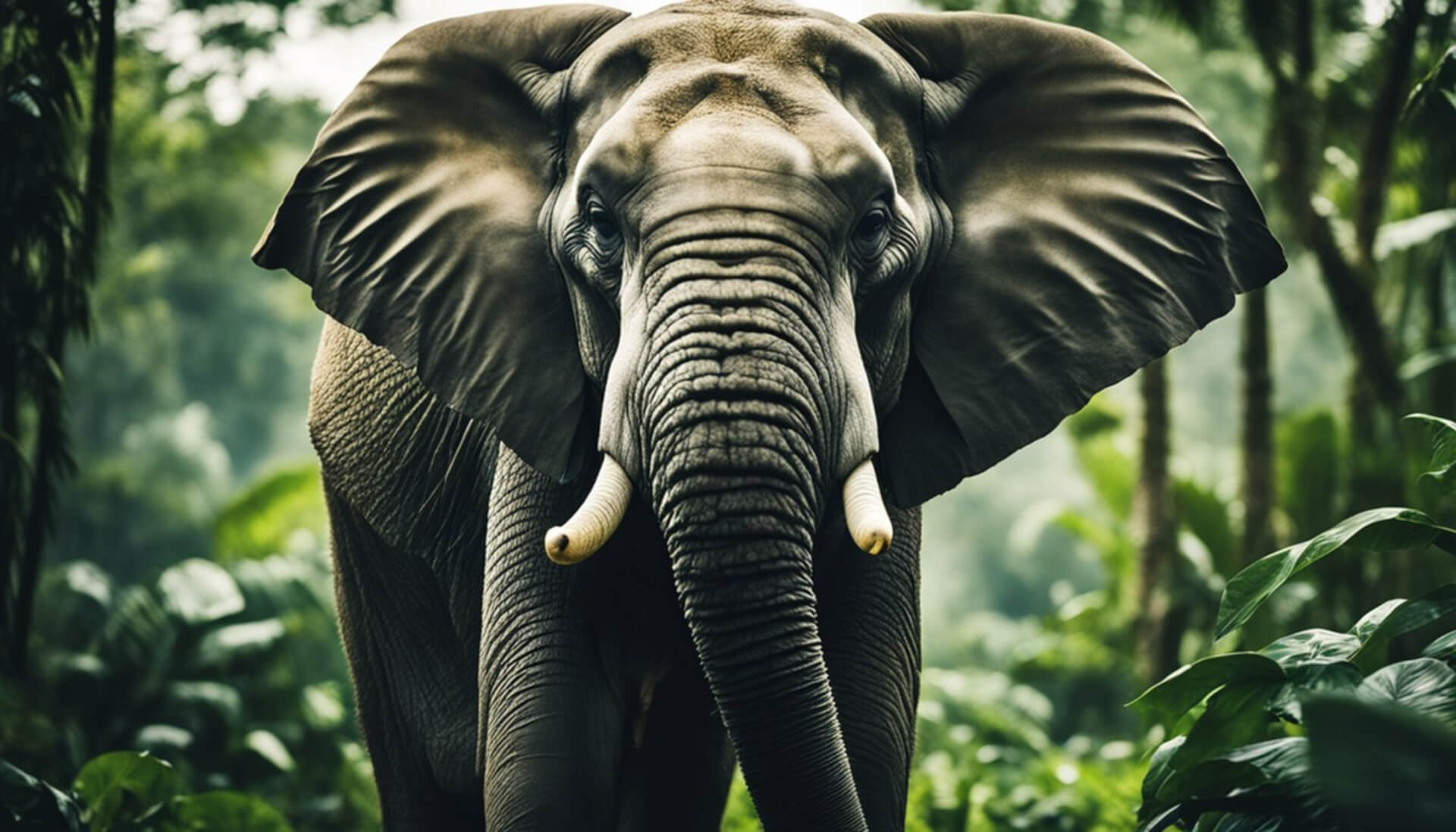The concept of a spirit animal is deeply rooted in many cultures. It represents a symbolic connection to the characteristics of a particular animal. When it comes to the elephant this majestic creature is often regarded as a symbol of strength, wisdom, and strong family ties. Elephants have played a vital role in spirituality and religion across various cultures, embodying the essence of power and serenity.
Their imposing presence, combined with a calm demeanor, inspires those seeking guidance or strength in their lives.
Embracing the elephant as one’s spirit animal may involve recognizing and valuing the traits that this animal represents, such as intelligence, loyalty, and the ability to overcome obstacles.
As a symbol of ancient wisdom, the elephant is often considered a guide for cultivating personal growth and fostering community bonds. In essence, the elephant spirit animal encourages individuals to connect with their inner strength and wisdom to navigate the complexities of life while promoting harmony and cooperation.
The Significance of Elephant as a Spirit Animal

The elephant spirit animal represents a complex weave of meanings such as immense strength, deep wisdom, and profound familial bonds. In various cultures, it is revered as a symbol of good fortune and unity.
Related: What is my spirit animal by birthday
Understanding Spirit Animals
Spirit animals are archetypal figures that manifest traits and qualities an individual may be aligned with or need to embody.
As a spirit animal, the elephant embodies power, determination, and strength, inspiring people to overcome obstacles. Those drawn to the elephant may find within themselves an innate capacity for wisdom and memory comparable to the elephant’s legendary recall abilities.
Individuals with the elephant as their spirit animal often possess a strong sense of family and community. They value the bonds that hold their networks together.
Related: How do I find out my spirit animal
The Cultural Symbolism of Elephants
Elephants are potent symbols in multiple cultures, signifying various attributes. For instance, the elephant is frequently associated with good luck and fortune in Eastern cultures, especially when the trunk is upwards.
Within the family domain, elephants symbolize unity and loyalty, reflecting their real-world behavior of maintaining close familial units.
Dreams involving elephants can be messages of encouragement. They can push one towards seeking wisdom and strength in one’s pursuits or relationships.
Their prominent role in culture and symbolism makes elephants universally recognized icons of positive qualities and spiritual guidance.
The Role of Elephants in Spirituality and Religion
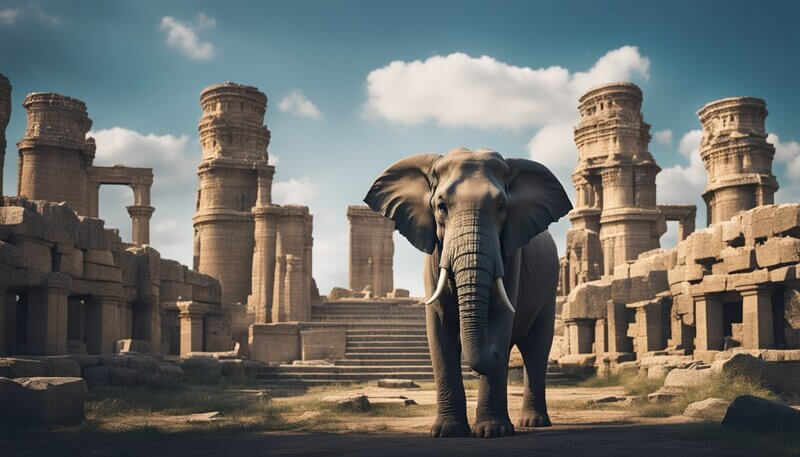
Elephants have spiritual and religious significance across various cultures. They symbolize wisdom, protection, and blessings. This serene animal often represents overcoming obstacles and ushering in good fortune.
Hinduism and the Deity Ganesh
In Hinduism, the elephant-headed deity Ganesh is revered as the remover of obstacles and the god of beginnings and wisdom. Worshipped for his intelligence and loyalty to his devotees, Ganesh is often invoked for blessings before the commencement of any new venture.
The image of Ganesh, with an elephant’s head on a human body, is a powerful icon of devotion and finds a place of honor in homes and shrines.
Buddhism and Elephant Symbolism
Buddhism holds elephants in high regard, utilizing their image to represent mental strength, steadfastness, and responsibility.
Buddha’s mother is said to have dreamt of a white elephant before giving birth, making the elephant a sign of divine fortune. In Buddhist teachings, the elephant embodies wisdom and the potent energy needed to uphold loyalty and a disciplined mind.
Elephant Presence in Other Religious Beliefs
Elephants appear in various other religious contexts, often symbolizing protection and loyalty.
Their roles in religious stories and iconography underline a universal recognition of their gentle strength and serene wisdom. In many African and Asian cultures, elephants connote devotion to family and community, extending their spiritual significance to encompass broader social dynamics.
Elephant Spirit Animal Traits and Meanings
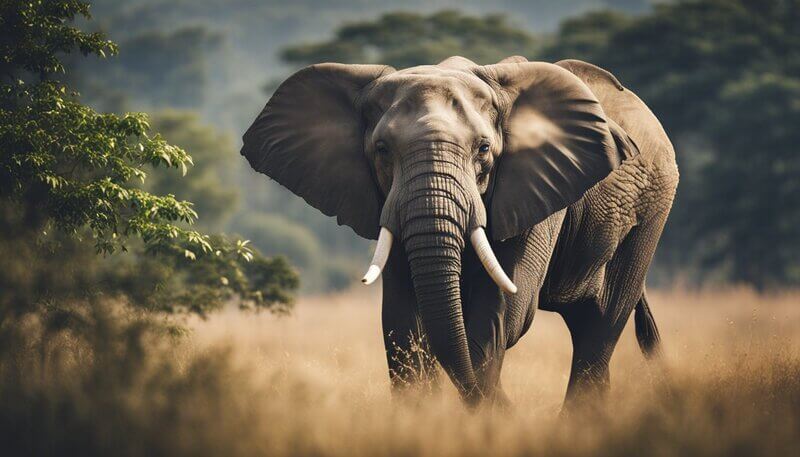
When exploring the symbolic significance of the elephant as a spirit animal, key traits such as wisdom, inner and outer strength, and powerful inner qualities emerge as central themes. These dimensions are not only a part of the animal’s significant presence in various cultures but also resonate with individuals who feel a deep connection to the elephant’s spirit.
Elephant Power and Strength
Elephants are often recognized for their immense physical power and strength. Symbolically, they reflect a person’s ability to face life’s adversities with fortitude.
The presence of an elephant as a spirit animal implies a natural resilience and an impressive capacity to persist through challenges with dignity.
- Physical Attributes:
- Represents: Formidable Presence and Influence
- Memory and Intelligence
- Embodies: Long-lasting impact and Wise decision-making
Inner Qualities Exhibited by Elephants
Beyond their physical might, elephants exhibit a rich tapestry of inner qualities. These include a profound sense of compassion, an expansive memory, and an intricate social structure driven by empathy.
Such traits mirror individuals who are guided by the elephant spirit, highlighting a personality that values deep emotional connections, passion, and energy directed toward nurturing and protecting loved ones.
- Gentleness and Compassion
- Implies: Empathetic concern and Grace in nurturing
- Inner Strength and Joy
- Signifies: Steadfast resolve and Ability to find happiness in communal bonds
Ancient Wisdom and Modern Interpretation
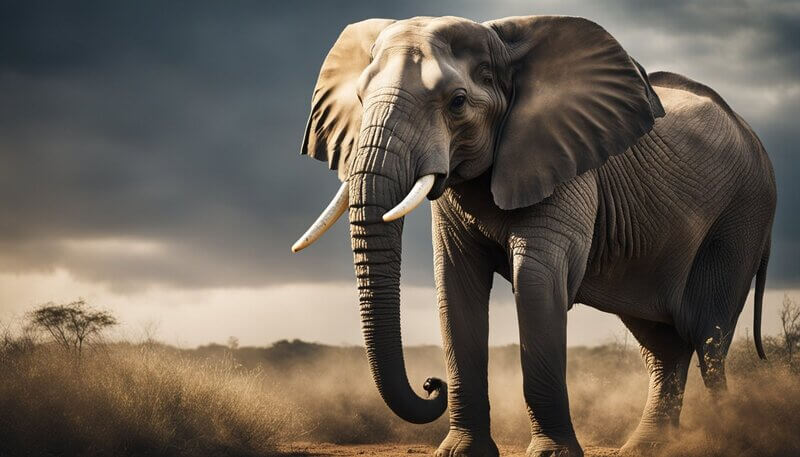
The concept of the elephant spirit animal is deeply intertwined with ancient wisdom that carries forward into modern interpretations. These interpretations often focus on the symbolic meanings derived from the elephant’s natural traits, such as its formidable memory and significant presence in dreams.
Lifelong Memories and Symbolic Meaning
Elephants are renowned for their exceptional memory, which serves as a metaphor for recollecting and retaining past experiences.
In this context, the recognition of elephants as a spirit animal signifies a connection to memory and the past. It suggests that an individual may need to reflect on previous lessons and harness the wisdom learned to inform current decisions.
Dreams and Their Connection to Elephants
Dreams featuring elephants can symbolize many facets of consciousness and subconscious understanding.
They could be interpreted as a sign of impending transformation or an invitation to explore more profound aspects of the self. This underscores the elephant’s role in dreams as a guide, reflecting the creature’s symbolic association with knowledge, inner strength, and spiritual development.
Incorporating the Elephant into Everyday Life

In today’s fast-paced world, embracing the tranquil and wise energy of the elephant spirit animal can foster a more profound sense of unity and prosperity in one’s personal development journey.
Elephant Symbolism in Personal Development
Unity & Community: The elephant is renowned for its communal lifestyle, often representing the importance of strong family bonds and cooperative spirit in one’s life.
By incorporating elephant symbolism, individuals are reminded to nurture relationships and prioritize communication within their personal and professional communities, striving for a harmonious life.
Compassion & Cooperation: Elephants are creatures of great compassion, known for their incredible empathy and cooperative behavior.
Emulating these qualities in everyday interactions can lead to more supportive and fruitful relationships. Individuals are encouraged to practice active listening and demonstrate understanding, enhancing the quality of their connections.
Fertility & Prosperity: Often regarded as a symbol of fertility, the elephant can inspire those seeking growth, be it personal, familial, or even within their careers.
Drawing on this aspect can help one remain focused on their goals for prosperity, approaching new ventures with the grounded strength of the pachyderm.
Longevity: Elephants have long lifespans, and their representation in one’s life can be a powerful reminder to plan for the long term, fostering sustainability and resilience.
Elephant and Human Interactions
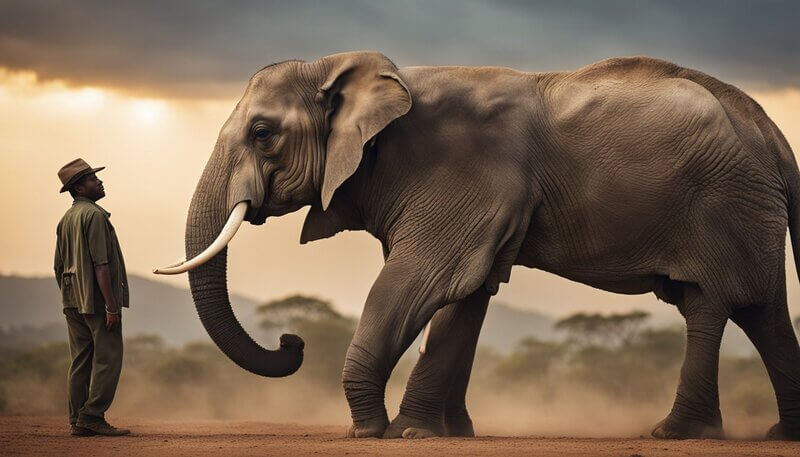
Elephants have shared a complex and multifaceted relationship with humans, traversing the boundaries of physical coexistence and cultural significance across Africa and Asia.
Conservation Efforts and the Future of Elephants
Conservation efforts play a crucial role in addressing the outcomes of human-elephant interactions. In Africa and Asia, the sustainability of elephant populations is closely linked to initiatives that protect habitats and foster human-elephant coexistence.
For example, protected reserves and anti-poaching laws are designed to safeguard African elephants, which face threats from habitat loss and ivory poaching. Similarly, in Asia, the survival of Asian elephants depends significantly on the enforcement of wildlife protection legislation and community-based conservation programs.
Cultural Differences in Elephant Perceptions
Elephant perceptions vary widely among different cultures, influencing the dynamics of human-elephant relationships. In some African cultures, elephants are often associated with community identity. Their survival is seen as integral to the cultural heritage.
In contrast, Asian cultures may regard elephants as sacred beings with a focus on their spiritual significance. For example, elephants can symbolize patience, wisdom, and strength within religious beliefs. They play a pivotal role in festivals and ceremonies. These diverse cultural views shape how societies interact with elephants and manage policies related to their conservation and welfare.
Artistic Expressions and Elephant Iconography
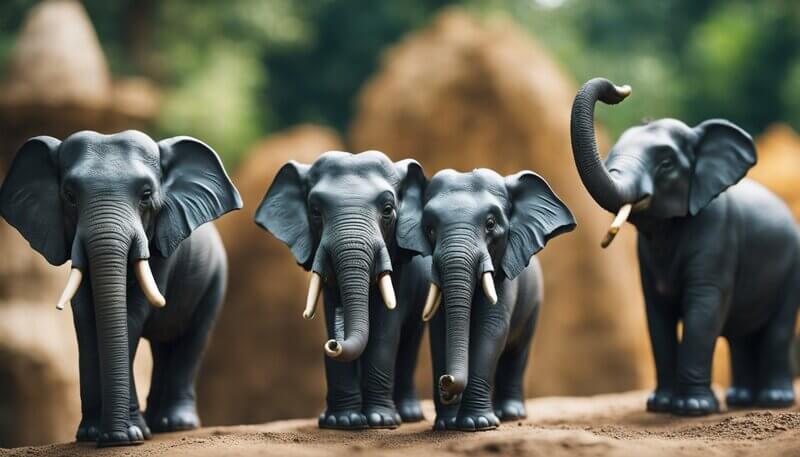
Elephants have been captured in diverse forms of art, symbolizing various cultural ethos and personal expressions. This imagery reflects the majestic nature of these creatures and the multitude of meanings they embody.
Elephants in Art and Popular Culture
The elephant has cemented its place in art and popular culture throughout history.
In the visual arts, elephants are recurrent figures in paintings, sculptures, and architecture. They often represent strength, royalty, and wisdom. These depictions span from the intricate carvings on ancient temple walls to modern street murals, showcasing the seamless blend of elephants into human artistic expression.
For instance, traditional art across Asia and Africa portrays elephants as symbols of power and stature. The animals are often revered in religious and mythological contexts. Similarly, in African Art, elephants are symbolic of strength and resilience. This is a testament to their significant role in the continent’s heritage and storytelling.
Meaning Behind Elephant Tattoos and Adornments
The elephant tattoo is more than just body art; it’s an intimate form of self-expression that imbues the bearer with the animal’s revered attributes.
Common symbolism associated with elephant tattoos includes wisdom, fertility, prosperity, and luck. People often choose this motif to represent their connection to the elephant’s meaning. They embody the traits of familial loyalty and longevity of memory.
Tattoos and adornments draw from global interpretations, manifesting in ornate, straightforward designs. A wearer may find a deep spiritual connection with these animals, eloquently illustrated through their tattoo artwork. Additionally, elephant tattoos might allude to patience, temperance, and virtue in Christian symbolism. The elephant sometimes signifies Christ-like mercy and strength.
Universal Themes and Elephant Archetypes

Elephants symbolize robust leadership and the intricate journey of life, reflecting in the way they navigate their ecosystem and their role within their communities. These gentle giants are often associated with attributes that many cultures and individuals aspire to embody.
Elephant Inspiration in Community and Leadership
Elephants are recognized for their complex social structures and community-oriented behavior. They exhibit a natural inclination towards leadership, often with a matriarch at the helm guiding the herd.
This leadership is not about dominance but wise stewardship and the group’s well-being. Elephants display empathetic leadership qualities such as cooperation, concern for the younger members, and collective decision-making.
These traits mirror ideals humans strive for within their societal constructs and often look to as an animal totem for inspiration.
Elephants as a Representation of Life’s Journey
As a totem animal, the elephant embodies the significance of life’s journey.
They have a lifelong bond with their family, never forgetting their ancestors and past loved ones. This signifies the importance of remembering and honoring one’s heritage.
AncestryDNA® + Family Tree PackageFeatured
Ancestry® - world’s largest consumer DNA network
- Do notable people run in your family?
- Understand your genealogy
- Build A family tree that takes you back generations
- We connect you to the places in the world where your story started
Their paths often become permanent routes for future generations, underlining the concept of legacy and the idea of life accumulating shared experiences.
Individuals drawn to elephant totems may contemplate their passage through life and how their actions resonate through their lineage and beyond.
Comparative Symbolism of Elephants in Various Cultures

Elephants are universally significant, yet different cultures attribute distinct symbolic meanings to these majestic animals. The comparative analysis of elephant symbolism reveals contrasts and similarities reflecting diverse cultural values and traditions.
African vs. Asian Elephant Symbolism
African elephants are commonly associated with strength and power. In many African cultures, they represent kingship and wisdom and are often revered as symbols of the community. Due to their ability to survive in the harsh African savannah and forests, they are seen as the epitome of toughness.
In contrast, Asian elephants carry a more religious and royal connotation, especially in countries like India.
They symbolize mental strength, earthiness, and responsibility. These creatures are integral to the Hindu religion, where the god Ganesh, who takes the form of an elephant, symbolizes good fortune and wisdom.
Global Perspectives on Elephant Symbolism
Across various cultures, elephants stand for memory, longevity, and social connection.
The idea of unity within diversity is evident in the global respect for elephants, demonstrating a shared reverence for these animals’ intelligence and familial bonds.
Elephant symbolism often emphasizes loyalty, leadership, and sturdiness, uniting different cultures under a shared symbol of respect for these animals.
They are revered for their immense physical power, emotional depth, and social complexity.
Despite cultural variances, elephants’ global symbolic representation bridges cultural gaps, fostering an appreciation that transcends geographical and cultural boundaries.
Connections to Nature’s Elements
In examining elephants’ spirit animal symbolism, their profound connection with the elements of earth and water stands out prominently. These ties are inherent in their physical and spiritual presence and influence various cultures and spiritual beliefs.
Elephants and Their Affinity with Earth and Water
Elephants are intrinsically linked to the earth due to their grounded nature. They traverse vast landscapes, shaping the natural world through their movement and behaviors.
Their presence is a constant reminder of Earth’s strength and stability, a quality reflected in their role as spirit animals.
Moreover, elephants have a notable relationship with water. They are often found bathing in rivers, which signifies their cleansing nature and the life-sustaining property of water.
Symbolic Importance of Tusks and Natural Elements
The tusks of an elephant hold profound symbolic importance, representing the intersection of the natural elements with the animal’s physical form.
Tusks are comprised of ivory, a material deeply rooted in the earth, yet their shape and size connect them to the idea of ascension and the ethereal, much like tree branches reaching for the sky.
This duality emphasizes the elephant’s connection to the terrestrial and celestial realms.
Additionally, tusks gather rain and other elements, emphasizing their bond with the natural world.
Challenges and Threats in the Wild
Elephants face various challenges and threats in the wild, primarily due to environmental pressures and human activities. Their survival hinges on their ability to adapt and their inherent resilience to these stressors.
Reflections on Elephant Conservation
In addressing elephant conservation, one must consider the multifaceted global efforts to preserve these keystone species and humans’ ethical obligations towards these magnificent creatures.
Global Efforts and Ecological Importance
Elephant conservation has gained traction through international cooperation and the recognition of elephants’ critical role in ecosystems.
They are known to create clearings in the forest that allow new plants to grow, disperse seeds, and help maintain the structure and biodiversity of their natural habitats.
The African Wildlife Foundation reports on programs aiming to retrieve weapons like snares and spears to protect elephants from poaching.
This restores not just the population but also the ecological balance they sustain.
Conservationists also monitor elephant populations as indicators of broader conservation success. Increasing numbers reflect the positive impact of their initiatives.
Ethical Considerations and Human Responsibility
Ethical considerations in elephant conservation are paramount, as they underscore human societies’ moral responsibility towards wildlife.
Breaking an elephant’s spirit for domestication or entertainment is not only ethically reprehensible but highlights a need for a compassionate approach to conservation.
While advocacy groups highlight the breaking of an elephant’s spirit using cruel methods, they also stress the importance of ethical wildlife tourism and the cessation of the ivory trade.
Embedded within these efforts is a call for humans to recognize their responsibility to protect elephants. This ensures their survival for future generations and the continued health of the environment.
Frequently Asked Questions
In addressing commonly asked inquiries, this section elucidates the spiritual symbolism of the elephant, the significance it holds in various cultural traditions, and how it may influence individual personalities and paths in life.
1. What does the elephant symbolize in spiritual contexts?
In spiritual contexts, the elephant is often associated with wisdom, strength, and loyalty attributes.
It’s regarded as a symbol of good fortune and prosperity and as an embodiment of patience and honor.
2. What does the African elephant symbolize?
The African elephant represents strength, resilience, and social connections.
It symbolizes the importance of community, memory, and overcoming obstacles.
3. What is the personality of an elephant?
Intelligence, a solid social nature, and a remarkable memory characterize the personality of an elephant.
Elephants exhibit care within their social groups and are known for their problem-solving abilities.
4. How can someone determine if the elephant is their spirit animal?
People may identify the elephant as their spirit animal if they feel a deep connection with its attributes.
They may also find themselves consistently drawn to elephants and their behaviors.
5. In what ways might an elephant spirit animal influence one’s personality traits?
An elephant spirit animal can encourage nurturing qualities such as empathy and compassion in one’s personality.
It may also inspire individuals to foster strong family ties and to act with dignity in various aspects of life.
6. What is the significance of elephants in spiritual or religious texts?
Elephants appear in spiritual and religious texts, symbolizing divine knowledge and power.
They are revered as sacred beings and are often associated with deities or serve as spiritual guides.
7. How does the concept of the elephant as a spirit animal relate to love and relationships?
The elephant spirit animal symbolizes commitment, stability, and loyalty, foundational elements in love and relationships.
It encourages forming deep bonds and protecting loved ones.
8. What are the considerations for getting an elephant spirit animal tattoo?
When getting an elephant spirit animal tattoo, it’s essential to consider the cultural significance and approach the subject respectfully.
Such tattoos often remind one of the traits one values or represent one’s spiritual journey.

